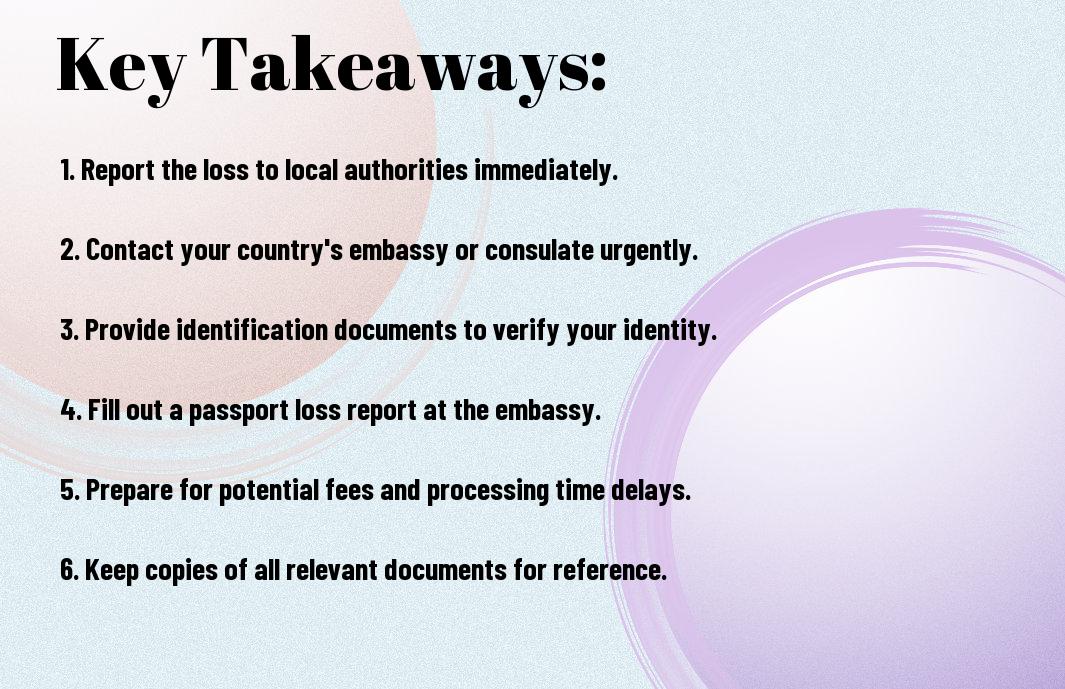There’s nothing quite as alarming as realizing you’ve lost your passport while traveling abroad. This document is crucial for your identity and re-entry to your home country, so it’s important to act quickly. In this guide, you’ll learn the necessary steps to take if you find yourself in this situation, from reporting the loss to obtaining a replacement. By following these straightforward instructions, you can minimize the disruption to your travel plans and ensure your safety and security while navigating through unfamiliar territory.
Key Takeaways:
- Report the Loss: Immediately inform local authorities and file a police report to document the loss of your passport.
- Contact Your Embassy: Reach out to your country’s embassy or consulate for assistance in obtaining a replacement passport.
- Gather Documentation: Collect necessary documents such as identification, photographs, and proof of citizenship to expedite the passport replacement process.
- Stay Informed: Familiarize yourself with local customs, laws, and emergency procedures regarding lost passports in your destination country.
- Secure Backup Copies: Keep electronic and physical copies of your passport and other important documents in a safe place while traveling.

Immediate Steps to Take
While losing your passport abroad can be distressing, it’s crucial to take immediate action. Start by identifying where and when you lost your passport, and look around for any possible locations it might have been misplaced. Contact local authorities for assistance and consider reporting the loss for added security. Your next steps will often involve contacting your country’s embassy or consulate for further guidance on replacing your passport.
Stay Calm and Assess the Situation
By keeping a level head, you can better navigate the situation. Take a few deep breaths and gather your thoughts; panicking will not help. Focus on recalling the last time you had your passport. This can help jog your memory and possibly lead you to its location or narrow down the circumstances of its loss.
Check for Alternative Forms of Identification
Against the backdrop of losing your passport, your next move is to look for any other identification you may have brought along with you. This could be a driver’s license, a photocopy of your passport, or an ID card issued by your country. Having alternative forms of ID can significantly ease the process of getting assistance from local authorities or your embassy.
Another option is to check your email or files for digital copies of your passport or any other identification documents. Many travelers store these documents in cloud services or emails for this reason. If you have scanned copies, they can be helpful when filing a police report or when applying for an emergency passport at the embassy. This documentation may also expedite the process of verifying your identity, so ensure that any travel documents you do possess are readily accessible during this time.
Reporting the Loss
Some immediate actions are vital when you realize your passport is lost. Begin by documenting the circumstances of the loss, including when and where it occurred. This information will be vital for both local authorities and your embassy or consulate. Keeping a record not only helps in filing reports but also assists in any potential identity theft issues you might face later.
Contact Local Authorities
Above all, report the loss to local authorities as soon as possible. This may be the police or a local government office, depending on the country. They will provide you with a report of the incident, which typically serves as an official record of your lost passport and may be required when you contact your embassy.
Report to Your Country’s Embassy or Consulate
Contact your country’s embassy or consulate promptly after reporting to local authorities. They can guide you through the recovery process and assist in replacing your passport as quickly as possible.
It is advisable to visit your embassy or consulate’s website or call ahead to confirm what documents you need to bring. Typically, you’ll need your police report, identification, and passport photos. Some embassies may allow you to fill out the necessary forms online before your visit. Being organized and prepared with all relevant information will facilitate a smoother replacement process.
Applying for a Replacement Passport
Your next step involves applying for a replacement passport. Depending on your location, you will need to visit your country’s embassy or consulate. The staff there will guide you through the replacement process and provide you with the necessary forms to fill out. It’s important to act quickly, as obtaining a replacement passport can take time, and you don’t want to delay your travel plans.
Gather Required Documentation
An important part of applying for a replacement passport is gathering the required documentation. You will typically need to provide proof of your identity, such as a police report confirming your passport was lost or stolen, a passport photo, and any supporting documents that verify your citizenship.
Understand the Application Process
Passport processing for replacements may vary by location. It’s imperative to follow the specific guidelines provided by your embassy or consulate to ensure a smooth application experience.
Process your application by filling out the required form and submitting it alongside the documentation you gathered. Be prepared to pay any fees associated with the passport replacement. After submission, processing times can vary; it’s advisable to inquire about expedited options if your travel is imminent. Stay in contact with the consulate or embassy for updates, and provide any additional information they might request.

Emergency Travel Documents
Despite losing your passport abroad, you have options for obtaining emergency travel documents. Many countries provide emergency solutions that can help you continue your journey. You should contact your local embassy or consulate to learn about the specific requirements and processes for acquiring these temporary documents. Taking immediate action will make your travel experience smoother during this challenging time.
Temporary Passports
Among the options available, temporary passports are often issued by your home country’s embassy or consulate when your passport is lost or stolen. These documents are valid for a limited duration and can facilitate your return home or allow you to travel to another destination. It’s important to bring identification and any relevant documents to support your application.
Travel Letters and Their Use
Beside temporary passports, travel letters can also be issued to assist you during your travels if you’ve lost your passport. These letters confirm your identity and explain your situation to authorities or airlines.
For instance, a travel letter may include details such as your full name, date of birth, and travel history, along with a declaration from your embassy confirming your citizenship. This document can help you navigate border controls or assist with airline check-in processes until your passport situation is resolved. Having this letter can alleviate stress and provide assurance that you are taking the right steps to regain your travel credentials.
Tips for Prevention
Once again, taking preventive measures can significantly reduce the risk of losing your passport while traveling abroad. Follow these tips:
- Keep your passport in a secure place, such as a hotel safe.
- Consider using a travel wallet to keep important documents organized.
- Don’t carry your passport in your back pocket or easily accessible bags.
- Stay alert in crowded areas and practice caution against pickpockets.
Any steps you take towards safeguarding your passport can lead to a more stress-free travel experience.
Preparing Before You Travel
Before your journey, it’s vital to give thought to how you will protect your passport. Research the laws and safety practices of your destination, and familiarize yourself with local customs to avoid drawing unnecessary attention to yourself. This preparation can go a long way in minimizing risks and ensuring a seamless travel experience.
Keeping Copies of Important Documents
Around your travel plans, it’s wise to create copies of your passport and other important documents. Store these copies separately from the originals and consider keeping digital versions in a secured cloud service. This strategy ensures that you have vital backup information should anything go missing during your trip.
Traveling without your passport can lead to significant disruptions. By keeping copies of your important documents, you provide yourself with a safety net. In addition to having physical copies, consider saving scans on your phone or a secure cloud platform. This way, even if your passport gets lost or stolen, you’ll have vital information on hand to help with replacement processes. Having this backup increases your chances of resolving any issues quickly and effectively.
Additional Resources
After losing your passport abroad, it’s crucial to have access to the right resources. Various organizations and websites can provide the necessary support and information to help you navigate the recovery process. From embassy details to online assistance, knowing where to turn can make all the difference in a stressful situation.
Useful Contact Information
Additional resources include contact information for your country’s embassy or consulate. Keep a personal record of these contacts, as well as any local emergency services, to ensure you can quickly reach out for assistance. They can guide you through the steps needed to replace your passport and offer other support.
Online Tools and FAQs
Among the resources available, many websites offer online tools and frequently asked questions, specifically designed for travelers facing passport issues. These platforms can provide instant access to information you may need.
This online assistance can guide you through the steps of reporting your lost passport, finding the nearest embassy, or accessing any forms required for replacement. Utilizing these tools allows you to gather necessary information quickly, which can ease your anxiety and streamline the process of getting your passport replaced while you are traveling.
To wrap up
Considering all points, if you find yourself in the unfortunate situation of losing your passport abroad, act promptly by reporting the loss to local authorities and contacting your country’s embassy or consulate. They can help you obtain a replacement. It’s also wise to document your passport details beforehand for easier reporting. For guidance on the specific steps to take to return to your home country, check this link on How do I fly back to the US if I lose my passport abroad?. Stay calm, and you’ll navigate this challenge successfully.